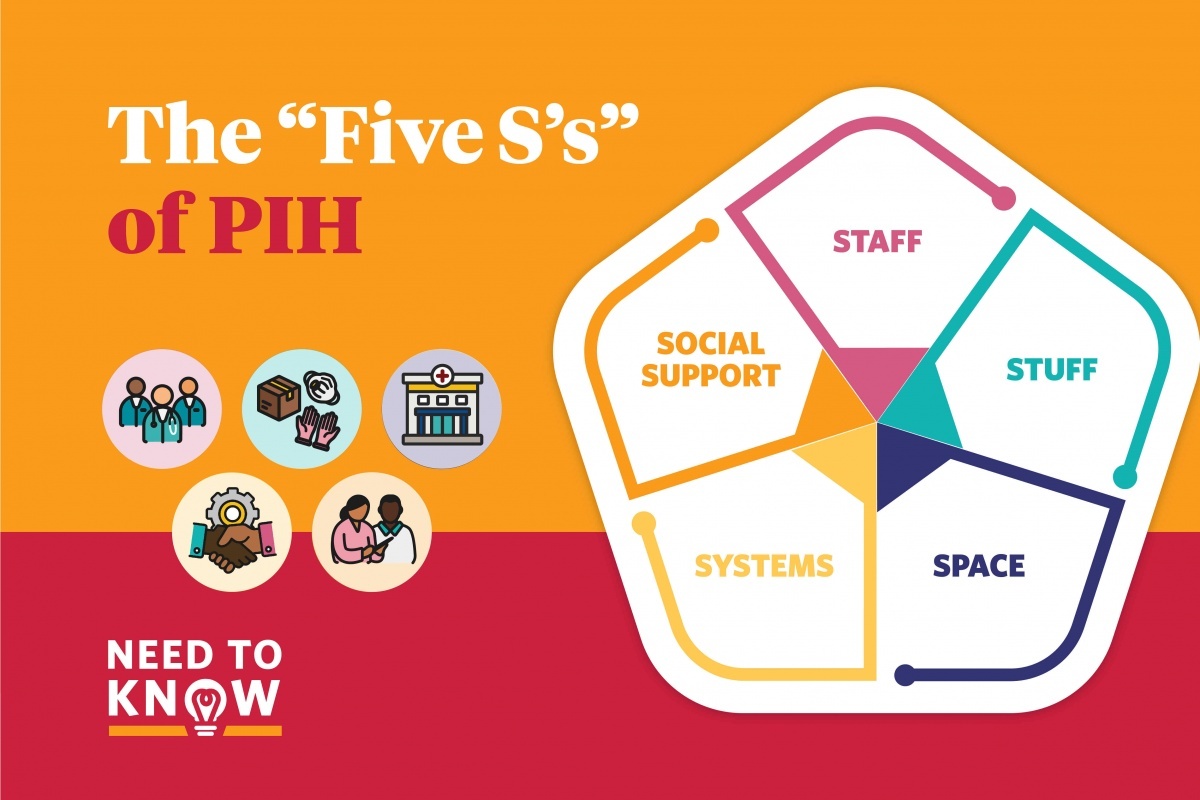PIH’s Five S’s: Essential Elements for Strong Health Systems
The staff, stuff, space, systems, and social support behind our everyday work
Posted on Jun 30, 2021

When we think of health system strengthening at Partners In Health (PIH), we always refer to five key elements: staff, stuff, space, systems, and social support. We call them the “five S’s” and use them to guide our work every day. Each element is equally important in providing high-quality care to our patients in the 11 countries where we work, responding to emergencies and building and reinforcing strong, long-term health systems, in collaboration with government partners. Each "S” is essential; eliminating just one of them results in a weaker health system.
The following is a definition of each of the 5 S’s, with concrete examples of our work:

1. Staff
With more than 19,955 global staff, we make it a priority to have well-trained, qualified teams in sufficient quantity to respond to needs around the globe. The roles of our staff are diverse and fall into nearly two dozen categories, such as community health, mental health, operations, nursing, program management, development, and communications.
We prioritize hiring staff from the country where they work and are proud to note this is true for 99% of PIH’s clinical staff, programmatic staff, and community health workers.
Meet some of our staff, including a nurse who runs adolescent and youth-friendly services in Sierra Leone, traditional and clinical midwives in Mexico, and community health representatives on Navajo Nation.

2. Stuff
The list of “stuff” we need is vast and includes everything from proper and ample vaccinations and medications, such as antibiotics to treat tuberculosis, to IV fluid and oxygen supplies. PIH’s global supply chain team has a list of 2,518 different items staff select to streamline procurement orders, standardize requests from health facilities to warehouses, and align with the different protocols in countries where we work. Because of their efforts, our colleagues have the tools and resources they need for care delivery and administration.
Read more about how PIH tracks resources and shipments.

3. Space
In order to treat patients, we need safe, appropriate spaces equipped with electricity and clean water. Sometimes these spaces already exist, but in most cases, facilities need to be renovated or built from the ground up. In collaboration with our partners, PIH creates, expands, and equips spaces so that they meet clinicians’ needs and provide a healing environment for patients.
Some examples of our work include:
- Expanding oxygen production and supported isolation for tuberculosis patients in Lesotho
- Improving water, sanitation, and hygiene facilities in Haiti
- Creating youth-friendly reproductive health centers in Liberia
- Opening a specialized unit for patients with severe COVID-19 in Mexico

4. Systems
This area of the 5 S’s seems invisible, but is no less important. Many systems must work in harmony to ensure consistent, quality care for patients around the world, including: a leadership and governance structure for solid decision-making, financial and accounting systems to track income and expenses, supply chain management to ensure well-stocked health facilities, medical informatics expertise for nimble record-keeping, and more.
Here are some examples of essential systems used across PIH-supported countries:
- An electronic medical record system in Sierra Leone
- A distribution center and software for medical storage in Haiti
- Strong management that uplifts and upholds PIH’s global mission

5. Social Support
To ensure effective care, we provide basic necessities and resources including food, housing, transportation, and financial support for patients and their families. PIH’s social support programming across all sites focuses on treating the whole patient, not just their condition.
Social support has proven an essential part of patient care and made the difference between a patient’s ability to recover from sickness and maintain good health over the long term. This support comes in many forms: food for patients on taxing tuberculosis treatment regimens, travel vouchers for cancer patients who need to make regular chemotherapy appointments, or safe housing for women living with schizophrenia.

